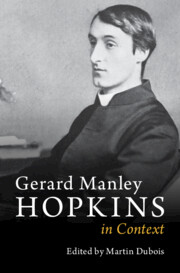Book contents
- Gerard Manley Hopkins in Context
- Gerard Manley Hopkins in Context
- Copyright page
- Contents
- Illustrations
- Notes on Contributors
- Note on Editions and Abbreviations
- Chronology
- Introduction
- Part I Places
- Part II Aesthetic and Cultural Contexts
- Part III Religious, Theological, and Philosophical Contexts
- Part IV Nature, Science, and the Environment
- Part V Gender, Sexuality, and the Body
- Part VI Form, Genre, and Poetics
- Chapter 25 Rhythm
- Chapter 26 Language
- Chapter 27 Address
- Chapter 28 Syntax
- Chapter 29 Rhyme
- Chapter 30 Ode
- Chapter 31 Sonnet
- Chapter 32 Letters
- Chapter 33 Journal Prose
- Chapter 34 Sermons
- Part VII Reception and Influence
- Further Reading
- Index
Chapter 33 - Journal Prose
from Part VI - Form, Genre, and Poetics
Published online by Cambridge University Press: 16 January 2025
- Gerard Manley Hopkins in Context
- Gerard Manley Hopkins in Context
- Copyright page
- Contents
- Illustrations
- Notes on Contributors
- Note on Editions and Abbreviations
- Chronology
- Introduction
- Part I Places
- Part II Aesthetic and Cultural Contexts
- Part III Religious, Theological, and Philosophical Contexts
- Part IV Nature, Science, and the Environment
- Part V Gender, Sexuality, and the Body
- Part VI Form, Genre, and Poetics
- Chapter 25 Rhythm
- Chapter 26 Language
- Chapter 27 Address
- Chapter 28 Syntax
- Chapter 29 Rhyme
- Chapter 30 Ode
- Chapter 31 Sonnet
- Chapter 32 Letters
- Chapter 33 Journal Prose
- Chapter 34 Sermons
- Part VII Reception and Influence
- Further Reading
- Index
Summary
Hopkins’s journals are usually read as source-books for his poems. Their fragmentariness smacks of the archive, seeming to position this material as purely of scholarly interest. These odds and ends are meant, it would seem, to be searched for aperçus, inscapes, what Whitman would call ‘go-befores and embryons’, later immortalized in verse. But it’s also possible to read the journals as literature in their own right: as a great poet’s utmost experiment with the possibilities of prose. Hopkins’s nature descriptions experiment relentlessly with the poetics of prose his letters assert piecemeal. He inherited an aesthetic of notation that, arising from the diaries of Romantic poets like Samuel Taylor Coleridge, was made irreversibly self-conscious within the published prose of his Victorian precursor, John Ruskin. Revealing an apparently spontaneous, self-shaping spirit alive in plants, stones, clouds, and water, Hopkins’s self-conscious sentences illuminate – as well as transcend – Victorian habits of intellectual enquiry.
- Type
- Chapter
- Information
- Gerard Manley Hopkins in Context , pp. 284 - 291Publisher: Cambridge University PressPrint publication year: 2025

